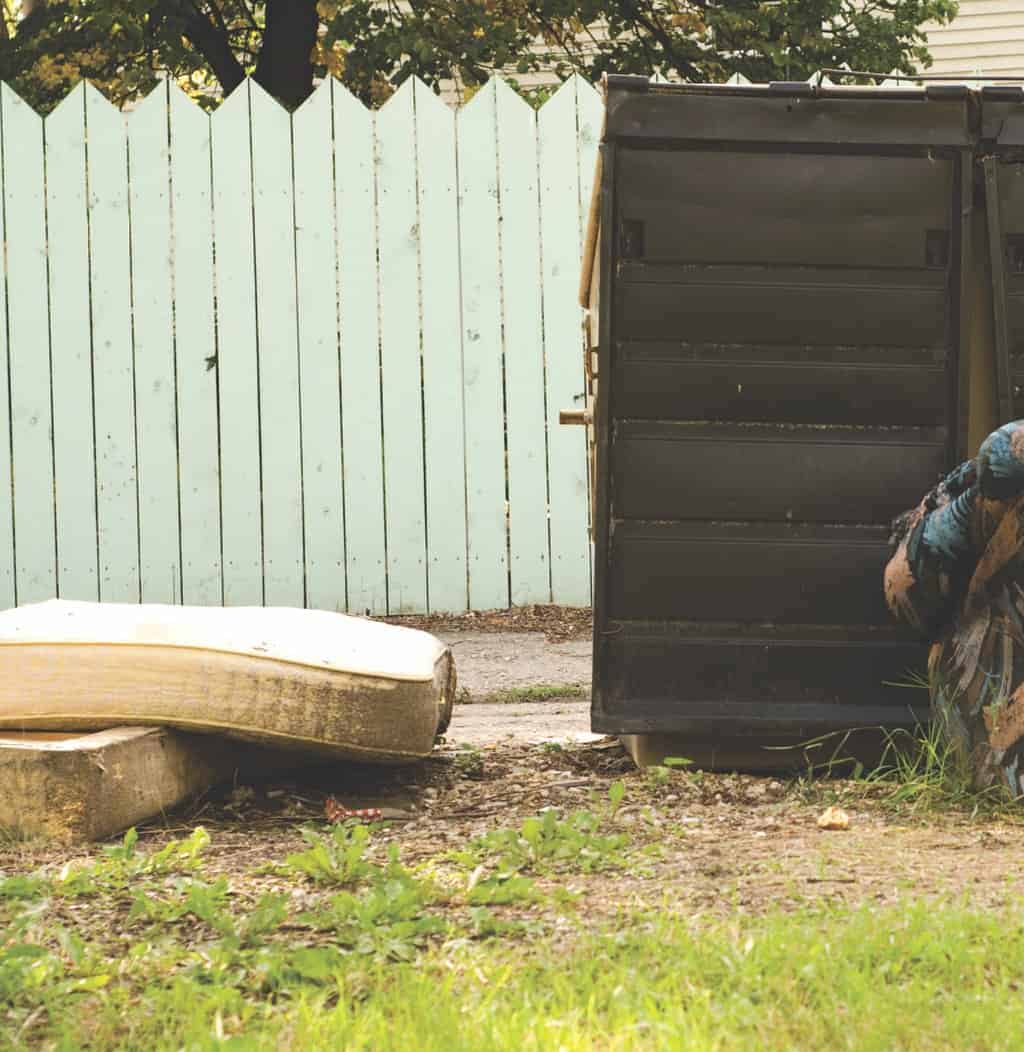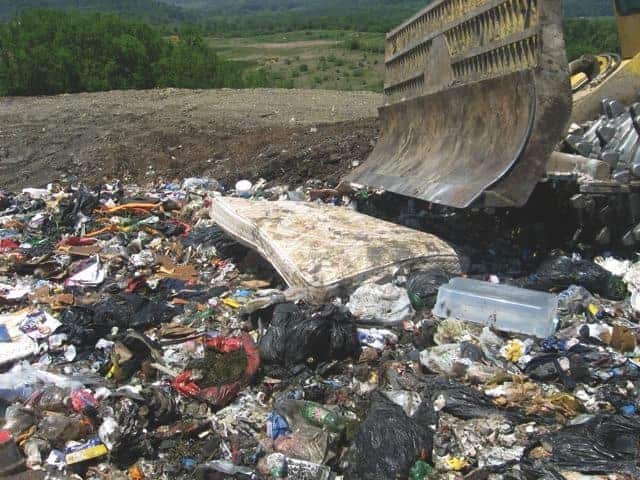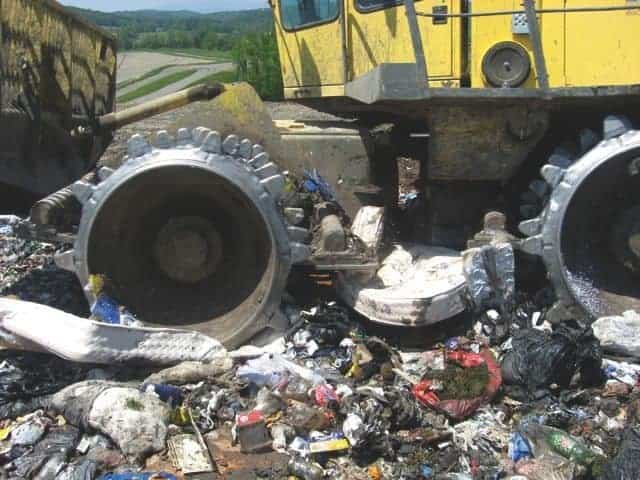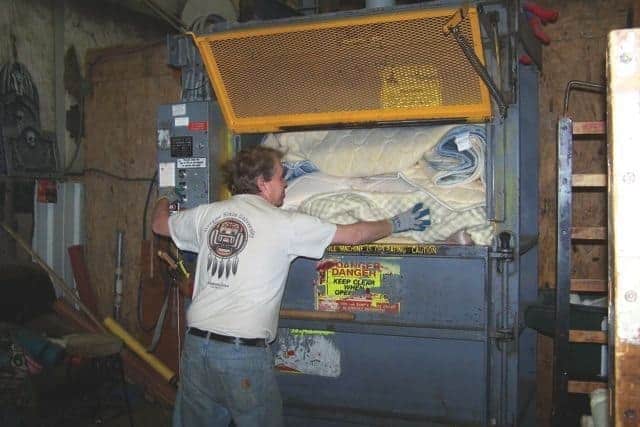
Companies selling mattress sets in three states soon will need to make some changes to the way they operate, as part of those states’ efforts to recycle bed components and reduce the number of mattresses and foundations heading for landfills.
Connecticut, Rhode Island and California passed mattress-recycling legislation in 2013 that will require retailers to collect a small fee on every mattress and foundation they sell. Under these laws, mattress manufacturers who sell beds directly to colleges and universities, motels and hotels, and the military or through other contract channels also must collect and remit the fee on those sales. That money will then be used to fund mattress-recycling efforts statewide.
To manage the recycling programs, the industry has created the Mattress Recycling Council, a nonprofit organization.
Connecticut’s law is the first to go into effect. That state’s timeline provides a rough idea of what to expect in the other two states.
Implementation timelines
Connecticut’s law required the mattress industry to submit a plan to the Connecticut Department of Energy & Environmental Protection by July 1, 2014, detailing how MRC will manage the recycling process in that state. Regulators have 90 days to review the plan. Once approved, MRC will have 120 days to implement the program—meaning Connecticut retailers and contract-sales manufacturers would begin collecting a flat, per-unit fee in early 2015, assuming there are no lengthy delays in the regulatory approval process. Regulators could call for revisions to the plan, which would postpone the process, but to minimize such delays, MRC is actively consulting with regulators in an effort to anticipate as many potential issues as possible before submitting the plan.
The Rhode Island and California laws have similar timelines and processes, but one year later, with plans due to regulators in those states by July 1, 2015, and fee collection expected to begin in early 2016.
Registration requirements
Each of the three state laws requires mattress manufacturers to register basic information with MRC—even though they won’t be involved in collecting fees on sales to retail consumers (except when selling through contract channels) or recycle mattresses directly.
That requirement of the law can be traced back to the history of product stewardship laws, in which the onus for end-of-life disposal typically was on manufacturers, says Chris Hudgins, vice president of government relations and policy for the International Sleep Products Association. He also serves as vice president of industry and external affairs for MRC. Although ISPA succeeded in modifying the laws to shift the manufacturer’s burden of performing and funding the recycling process to MRC, the requirement that manufacturers register with MRC remains.
As a practical matter, all retailers selling in Connecticut and Rhode Island also need to register with MRC so they can remit their collected recycling fees, Hudgins says.

Mattress manufacturers in Connecticut were required to register by July 1, 2014, says Mike O’Donnell, MRC program director. Companies in Rhode Island and California must register through MRC by July 1, 2015.
For all three states, registration is done through a secure portal on the MRC website at www.mattressrecyclingcouncil.org. Registration is free and requires companies to provide basic contact information such as company name, address, phone number, etc. Manufacturers will be asked to provide the Universal Registration Number or brand information. During the registration process, companies create a user name and password.
Recycling fees
In all three states, retailers and contract-sales manufacturers are required to collect a small fee on every mattress and foundation unit sold. The fee, which is subject to state sales taxes, must be clearly displayed on each invoice or receipt. Online retailers selling mattresses in the states also must collect the fee.
Subject to regulatory approval, MRC has proposed the recycling fee in Connecticut to be $9 per piece. This fee would apply to each mattress and foundation unit sold in the state, regardless of the piece’s price, size or type. That means the total recycling fee on a two-piece bed set would be $18—$9 for a mattress and $9 for a foundation. The fee is non-negotiable and cannot be waived or reduced by the retailer.
Each of the state recycling laws sets different requirements, which will affect the costs MRC must incur. Likewise, the cost of labor, real estate overhead and other factors relevant to transporting and recycling mattresses will vary from one state to the next. Nevertheless, MRC’s goal is for the fees in all three states to be as similar as possible.
The fee will pay for the cost of recycling mattresses and foundations discarded by consumers, municipalities, retailers and other parties in each state, including transportation expenses, O’Donnell says. The fee also covers MRC’s overhead and expenses. Consumer education is part of MRC’s duty and costs, as well.
All three state laws allow for the industry and MRC to adjust the fee up or down as needed to reflect the actual cost of running the recycling programs.
“The fee is initially based on a projection of mattress sales in that state and the number of mattresses we anticipate will be recycled through the program,” O’Donnell says. “Once the program is implemented, MRC may periodically raise or lower the fee to make sure the program has sustainable funding for long-term operations.”
As a nonprofit, MRC has an incentive to meet its legal obligations as efficiently as possible and will issue annual reports on its activities, including an analysis of how it spends collected fees, O’Donnell says.
It’s important to keep the recycling fee low, says Ryan Trainer, president of ISPA and MRC. “We want the fee and the fee collection process to be as ‘low burden’ as possible,” he says. “Our goal is to recycle more mattresses without disturbing the flow of sales, to keep the process simple and to maintain a level playing field.”

Any sales data that individual mattress retailers provide to MRC will be exempt from disclosure, Hudgins says. The laws, however, require MRC’s annual report to include aggregate sales and fee data in the states for all retailers and contract-sales manufacturers in the states.
Verifying compliance
To monitor compliance of the laws, MRC must submit annual reports detailing information about its budget, staffing, aggregate fee collection and other information. These public reports will allow state regulators, taxpayers and the industry to monitor MRC’s activities.
At a retailer level, MRC will work with regulators in each state to verify that all companies are complying with the laws and collecting all appropriate fees.
“It’s important that everyone participates in the program so that all retailers are operating on a level playing field,” O’Donnell says. “MRC’s program budget also includes an audit process so that we can confirm retailer participation.”
Getting mattresses recycled
Under all three laws, the fees collected will be used to cover the costs of recycling mattresses. MRC will contract with companies in each state to collect, haul and recycle mattresses and foundations. In Connecticut, for instance, there are expected to be two MRC-contracted recyclers when the recycling program begins in early 2015.
But, O’Donnell emphasizes, “Retailers in Connecticut and Rhode Island aren’t required to recycle or even collect mattresses themselves.” In California, however, retailers that deliver new mattresses to a consumer must, at the consumer’s request, pick up the old mattress. Retailers can charge for delivery, but not for used-mattress removal. Even in California, retailers aren’t required to actually recycle the mattresses, and they have no obligation to pick up a used mattress if they don’t deliver a new mattress to the consumer or deliver via common carrier.
Still, MRC encourages retailers and manufacturers to actively participate in mattress recycling. It reduces the numbers of bed sets going to landfills, enhances the industry’s reputation as good stewards of the environment, and could help retailers cut their disposal costs.
“We want companies to recycle and are prepared to work with them to make that happen,” Trainer says.
What’s ahead?

And, as programs in Connecticut, Rhode Island and California continue to develop, MRC encourages manufacturers, suppliers, retailers and recyclers to offer suggestions and contribute ideas for improvement.
“We want stakeholders to provide feedback to MRC so that the programs we develop are the most practical and least expensive for everyone involved,” Hudgins says.
In terms of publicizing and explaining the programs to retailers and consumers, MRC is developing webinars, point-of-purchase materials and other items to educate retailers and consumers about participating in the new programs. All will be available from MRC or posted on its website at www.mattressrecyclingcouncil.org.
MRC and ISPA representatives also have been explaining the new laws at industry events, including ISPA EXPO 2014, a meeting of the International Association of Bedding Law Officials, the Association of Nonwoven Fabrics Industry Conference, the Furniture/Today Bedding Conference and a meeting of the Carpet Cushion Council. This month, they are attending the Las Vegas Market; in coming months, they are planning to attend a Solid Waste Association of North America conference and a meeting of the American Chemistry Council’s Center for the Polyurethanes Industry.
For all of these state programs to be most successful, all parts of the industry must work together. First, all companies with statutory duties must follow the law. In addition, manufacturers can help retailers educate consumers about the new fees and suppliers can help to create new markets and uses for recycled components, Trainer says.
“We want to work with the retailers to make the mattress-recycling fee and programs positive,” he says. “We, as an industry, have a good story to tell about mattress recycling and the environment. Recycling keeps mattresses out of the landfills and off the roadsides.”
 For more information
For more information
- Mattress Recycling Facility Locator
- What is the Mattress Recycling Council?
- Where the parts and pieces of recycled mattresses go (diagram)
- A closer look at mattress recyclers (at Sleep Savvy magazine)
- Mattress recycling stats
For the latest information about mattress recycling, bookmark the Mattress Recycling Council’s website and check it often. If you have specific questions, email [email protected]. BedTimes also offers regular updates about recycling in the print magazine and online at www.bedtimesmagazine.com.
This story was published originally in sister publication Sleep Savvy.





